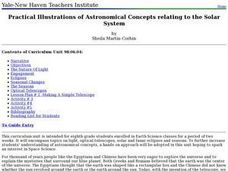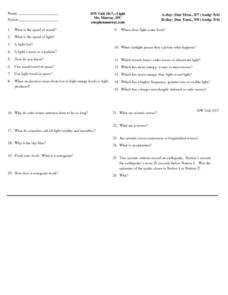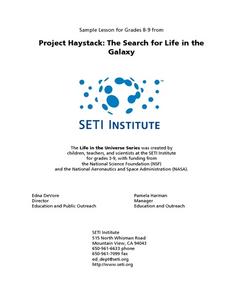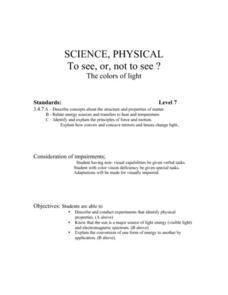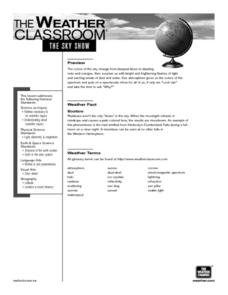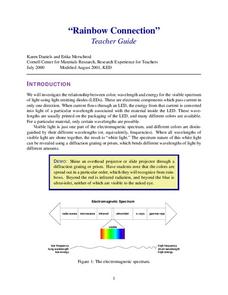Electromagnetic Spectrum Teacher Resources
Find Electromagnetic Spectrum lesson plans and worksheets
Showing 402 resources
University of Colorado
Enceladus, I Barely Knew You
Use spectral knowledge to make discoveries on a distant moon. Small groups gather information from images of one of Saturn's moons. The moon orbits within the E-ring made up of mainly water ice. Using information about the composition of...
Curated OER
Light
For this light worksheet, students read what makes light, the speed of light, and the electromagnetic spectrum. Students complete 12 matching, 8 fill in the blank, and 9 word problems.
Alabama Learning Exchange
Light Is
Students explore the properties of light. In this light lesson, students investigate visible light by viewing a website, examining an electromagnetic spectrum chart, and observing light demonstrations. Students write about their...
Curated OER
Practical Illustrations of Astronomical Concepts Relating to the Solar System
Eighth graders are introduced to concepts related to the Solar System. In groups, they participate in an experiment in which they must describe a ray of light and how it travels. They draw a diagram of the electromagnetic spectrum and...
Curated OER
HW Unit 10:7-Light
In this light worksheet, students answer twenty six questions about sound and light and how they both travel. They also answer questions about different types of waves in the electromagnetic spectrum such as radio waves, visible light,...
Curated OER
Electromagnetic Energy and Its Spectrum
Students explain how electromagnetic radiation travel in space. In this physics lesson, students design and implement an experiment to reduce UV exposure. They discuss and share their findings in class.
Curated OER
Chloroplasts and Pigments
In this plant pigments worksheet, students compare the function of 3 types of pigments: chlorophylls, carotenoids, and phycobilins. This worksheet has 23 fill in the blank, 3 drawing, and 2 short answer questions.
Curated OER
How Long Would It Take To Travel To the Stars?
Students consider the amount of time that it would take to get to the star, Sirius using various modes of transportation, some practical and some whimsical. The practicality of physically going to another star system is explored in this...
Curated OER
Summer Research Program for Science Teachers
Students analyze the optical region of the electromagnetic spectrum.
Curated OER
To See or Not to See: The Colors of Light
Seventh graders describe and conduct an experiment that identifies the physical properties of light. They explore sources of visible light and an electromagnetic spectrum. Students explain the conversion of one form of energy to another.
Curated OER
Elements
In this elements worksheet, students determine the atomic number, mass, number, electrons, protons, and neutrons for elements. Students review the electromagnetic spectrum. This worksheet has 1 graphic organizer and 13 multiple choice...
MinutePhysics
The Origin of Quantum Mechanics (feat. Neil Turok)
How do you get the most light out of a light bulb? That's the task Max Planck took on, and it turned out to be rather...enlightening! The illustrated video introduces physics scholars to Planck's plight, which ultimately changed our...
University of Colorado
Designing an Open Spectrograph
Take the class over the rainbow. Pairs or small groups follow directions to create a spectrograph. The pupils measure the angles formed by the different colors of the spectrum along with calculating the lengths formed by the spectrum and...
PBS
Cosmic Microwave Background Explained
As part of their Cosmology series Space Time presents a video that explains the history of electromagnetic waves and the shifting and expanding wavelengths. It finishes by exploring cosmic microwave background radiation.
MinutePhysics
Computer Color is Broken
Is your smartphone really doing its best work when it comes to color? The narrator describes technology's lazy approach to recreating colors in an insightful video. Science scholars discover how digital cameras store...
American Chemical Society
No, Your Microwave Isn't Dangerous - Food Myths #1
Are microwaves a fast way to cook—or a fast way to get radiation poisoning? Science scholars get their facts straight with a video from the American Chemical Society's Reactions series. The narrator explains how microwaves work as well...
Curated OER
Spectral Surprise
Students create spectral colors. In this hands-on science lesson, students examine the electromagnetic spectrum as they follow steps to create a model that separates and displays light.
Curated OER
Ways to See the Sun
Students examine how the regions of the Sun are studied using spectroscopy. They investigate the electromagnetic spectrum and the types of radiation that are associated with it. They use prisms and CD's to examine the light spectrum....
Curated OER
Photometry
Young scholars examine blackbody radiation and light wavelengths. Students research the various types of electromagnetic spectrum. Young scholars examine any misconceptions they may have in light.
Curated OER
Supernova Chemistry
Using spectroscopes, high school astronomy, physics, or chemistry learners observe emission spectra from several different sources. This stellar NASA-produced lesson plan provides terrific teacher's notes and a student handout. Make sure...
Curated OER
Sky Show
Students participate in a discussion of the sky and colors. They watch a demonstration of how colors can change. They examine the issue of if weather should be a part of their coursework.
California Institute of Technology
Physics of Light
Gummy bears are tasty, but did you know they are also used to determine color and light properties? Use the activity as a way to demonstrate light absorption, light reflection, and refraction with high schooler....
NASA
Things Are Not Always What They Seem
Science is magic that works. Magical color-changing beads and a coffee can that follows voice commands are just two examples of magic tricks that rely on science. After completing a hands-on activity and an experiment investigating the...
Cornell University
LEDs Rainbow Connection
View LED lights through the eyes of a scientist. Young scholars learn to view light as a wave frequency and connect various frequencies to different colors on the light spectrum. A lab activity asks groups to measure the frequency of...





